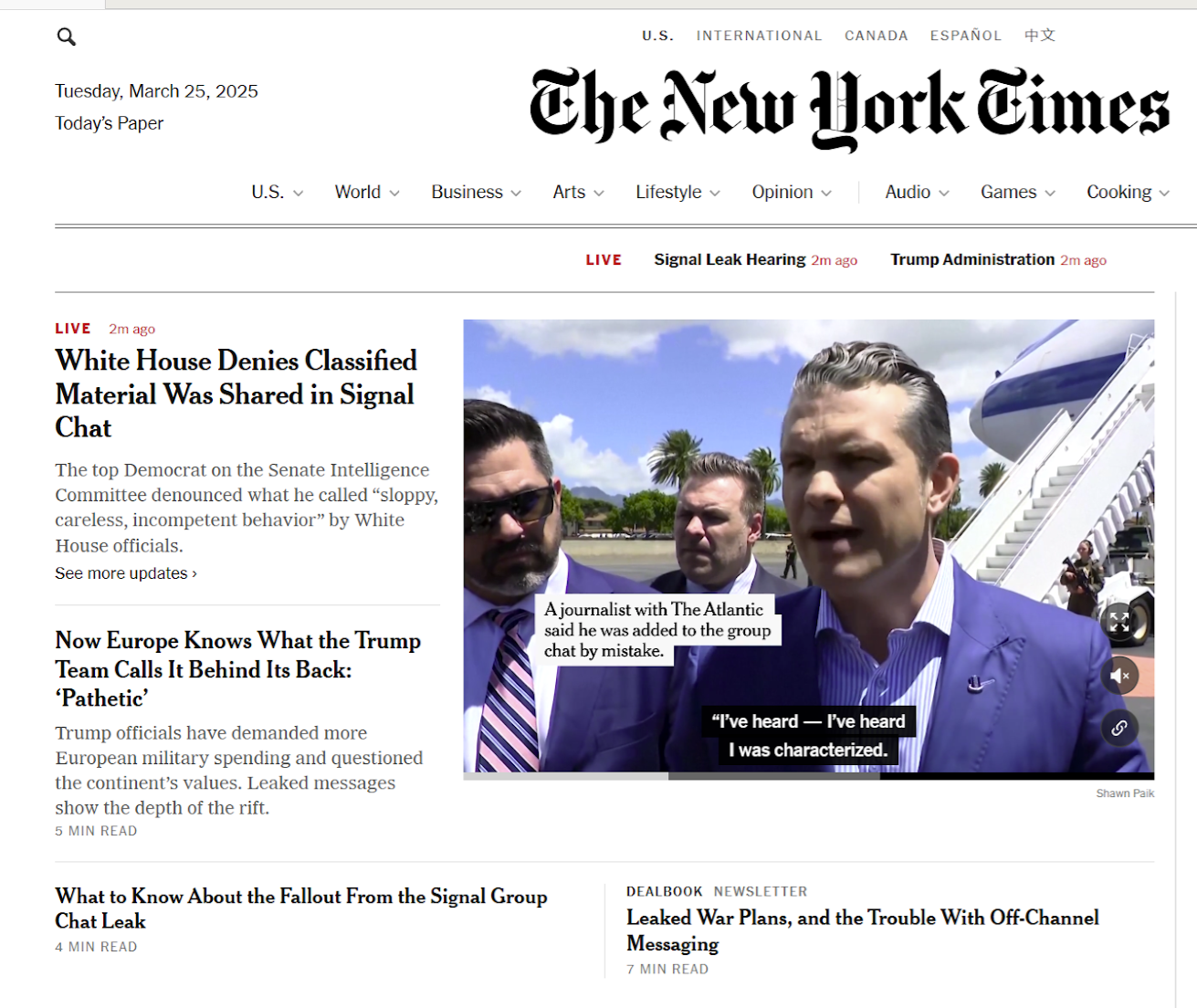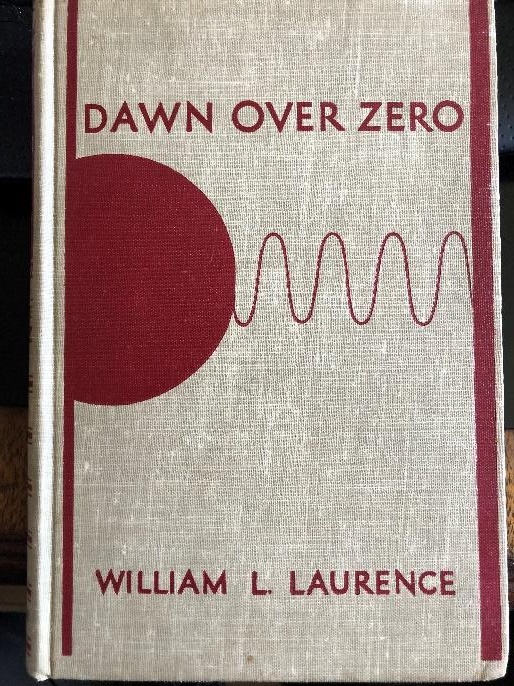
Posted March 26, 2025
By Byron King
The Bombshell That Wasn’t: Goldberg’s Career-Ending Mistake
Yesterday, I mentioned how absurd it was for senior U.S. officials to use Signal for their communications. I still find it ridiculous, but according to Fox News, government regulations permit it.
Including a journalist so antagonistic to Trump in a chat group with senior officials discussing war plans seemed, at best, hare-brained and, at worst, outright negligent.
But I also wondered: could this have been done on purpose?
Fortunately, our friend Byron King did some digging. It seems that this inclusion was almost certainly intentional, and Atlantic editor Jeffrey Goldberg was too oblivious to grasp it.
I’ll let Byron take over from here. Keep reading for some exclusive insights you won’t find anywhere else…
The Bombshell That Wasn’t: Goldberg’s Career-Ending Mistake
So, there I was… enjoying my $3,000 gold, and this showed up from the New York Times:
 In the screenshot, The New York Times has high drama over “classified” stuff.
In the screenshot, The New York Times has high drama over “classified” stuff.
Uh-oh… Security breach by Trump's people! Figures, right? MAGA trogs, yes? Can’t trust those knuckle-draggers with anything. It must be the case because the NY Times says so.
Whoa! Wait a sec… Not so fast. This may be the standard, front-page, lefty-rag narrative, but it’s not the story because there’s another take on what happened…
Yes, Reporters Have Access
First, some background. Since World War II and before, favored reporters have had deep, inside access to important political and military stories long before they went public.
For example, during the aforementioned WWII, no less than the New York Times had a guy inside the Manhattan Project, with an office at Oak Ridge, Tennessee, and access to players that ranged from Robert Oppenheimer to General Leslie Groves.
Groves recruited the Times man, a journalist named William Laurence, specifically to chronicle how the U.S. developed the atom bomb. And in every practical sense, Laurence was the official historian of the effort.
Laurence routinely wrote detailed reports on who did what and how progress was being made towards the goal. Then, his hard and diligent work went into a well-guarded safe. Laurence published extensively in the Times post-war about how the atomic weapon project evolved. He became quite famous, and the Times burnished its corporate reputation as a newspaper of record.
 Dawn Over Zero, 1946 first edition. BWK collection.
Dawn Over Zero, 1946 first edition. BWK collection.
Among other things, Laurence witnessed the first nuclear explosion at Trinity, New Mexico, in July 1945, and a few weeks later rode on an aircraft that monitored the atom bomb dropped onto Nagasaki. In 1946, he published a well-received book on his experiences, entitled Dawn Over Zero, the Story of the Atom Bomb (Knopf, 1946); see image above.
This is just one example of how things work in the U.S. government, no matter who runs the White House, Pentagon, State Department, and more. Innumerable similar stories could be told about deep access granted to outside reporters, dating back to the Korean War, Vietnam, the Cold War, and more.
Over the past 35 years, since the days of Desert Shield and Desert Storm in 1990-91, the U.S. military has extensively embedded reporters with military units on actual missions, to chronicle what happens. And on occasion, reporters and related players like cameramen have been injured or even killed in action. If you deal with the U.S. military – and I spent over 30 years in the Navy – you know this.
The same thing happens outside combat zones. Occasionally, senior leaders or policymakers allow a visitor to attend meetings, listen to calls, or hear briefings. The ground rules are rooted in absolute discretion, which means that the invitee is not to discuss or write about the subject matter until some future time. There. Are. Rules. (If not unwritten rules.)
At the highest levels, this is how Bob Woodward, of the Washington Post, compiled source material for his many inside-scoop books on Presidents Trump, Obama, George W. Bush, Clinton, George H.W. Bush, and Reagan. The presidents agreed to talk with the man both on and off record, and Woodward built a long career writing articles and telling gossipy stories.
Now we have this recent matter, with an editor of The Atlantic magazine who became privy to chit-chat between Vice President Vance, National Security Adviser Waltz, Defense Secretary Hegseth, and others.
Who Invited This Dirtbag?
My colleague Sean Ring discussed the basics in the Rude Awakening yesterday (March 25th). That is, a couple of weeks ago, key U.S. policymakers used Signal, a messaging app, to share information about a military strike on the nation of Yemen.
For some strange reason, the thread included Jeffrey Goldberg, editor-in-chief of The Atlantic. To which I must say “huh?” because this guy is a long-term, visceral Trump-hater. He slammed President Trump in 2020 with a story about how the Orange Man allegedly said American soldiers in military cemeteries were “suckers and losers.” Trump vehemently denied saying that, or anything remotely like it.
In this respect alone, it’s beyond surprising – it’s outrageous – that anyone in the current Trump administration would give Goldberg even the time of day. So, how did he get onto the chat? It’s one of life’s mysteries, although it was via National Security Adviser Waltz’s office.
Then again, consider... Perhaps someone in the Waltz camp thought allowing this Trump-hating firebrand in on the thread might be beneficial. It’s a dumb idea, but maybe the desired end-state was that he’d glean some insight into the small talk of policymaking and pass it along to readers of The Atlantic.
From the thread, it was interesting to learn that Vice President Vance framed the matter in terms of how little stomach the general U.S. population has for another warlike commitment in the distant Middle East. In this sense, Vance has his finger firmly on the American pulse. Bravo, JDV!
Another message the Trump administration wanted to send was to reassure America’s long-time allies. That is, despite all the tariff-talk and problematic future of Greenland, the U.S. would once again rescue the “pathetic” Europeans, a characterization from no less than SecDef Hegseth.
Notably, per the leaked thread discussion, only 3% of U.S. trade requires the Red Sea or Suez Canal to transit, while over 40% of European trade uses those waters. And yet the U.S. Navy is currently doing the military heavy lifting here. Again, and for the umpteenth time, the U.S. bails out those welfare-state Euro-weenies.
Plus, per the thread, we learned that Trump’s people think that the Europeans, and even Egypt with its nice canal, should pass the plate and pay to reimburse for those expensive cruise missiles and jet flight hours America is burning up.
I suspect that we don’t yet know the entire story of what occurred here. Obviously, what happened with Mr. Goldberg wasn’t quite the same as William Laurence at Oak Ridge or Dawn over Zero, although The Atlantic man had a unique opportunity to glimpse inside the dark rooms.
Right now, one thing is for sure… This Atlantic editor is radioactive for the remainder of the Trump administration, if not forever, when Republicans have any say. He’s persona non grata. He’ll never have lunch again anywhere near anything important to Trump-world, and heck, even Democrats can’t trust him to behave.
As for all the discussion of a security breach? It’s grist for the political attack machine against Trump and his appointees, which is no surprise. But don’t be distracted by smoke and mirrors. Move on to the next big thing and make some money.
That’s all for now. Thank you for subscribing and reading.

Private Equity’s Latest Target: Your Parents
Posted April 02, 2025
By Sean Ring

Gold to the Moon, Crypto to the Morgue
Posted April 01, 2025
By Sean Ring

TANKED! Trump’s Tariff Update
Posted March 31, 2025
By Sean Ring

Your Wallet: Fill ‘Er Up!
Posted March 28, 2025
By Sean Ring

A National Security Sh*tshow
Posted March 25, 2025
By Sean Ring
